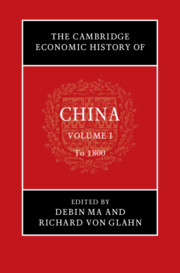Book contents
- The Cambridge Economic History of China
- The Cambridge Economic History of China
- The Cambridge Economic History of China
- Copyright page
- Contents
- Figures
- Maps
- Tables
- Contributors to Volume I
- Acknowledgments
- Note on Citations
- Introduction to Volume I
- Part I Before 1000
- Interlude
- Part II 1000 to 1800
- 7 Ecological Change and Resource Constraints
- 8 Population Change
- 9 Public Finance
- 10 Political Economy
- 11 Law and the Market Economy
- 12 Property Rights and Factor Markets
- 13 The Rural Economy
- 14 Cities and the Urban Economy
- 15 The Monetary System
- 16 Merchants and Commercial Networks
- 17 Foreign Trade
- 18 Production, Consumption, and Living Standards
- Bibliography of Primary Works Cited
- Index
- References
13 - The Rural Economy
from Part II - 1000 to 1800
Published online by Cambridge University Press: 07 February 2022
- The Cambridge Economic History of China
- The Cambridge Economic History of China
- The Cambridge Economic History of China
- Copyright page
- Contents
- Figures
- Maps
- Tables
- Contributors to Volume I
- Acknowledgments
- Note on Citations
- Introduction to Volume I
- Part I Before 1000
- Interlude
- Part II 1000 to 1800
- 7 Ecological Change and Resource Constraints
- 8 Population Change
- 9 Public Finance
- 10 Political Economy
- 11 Law and the Market Economy
- 12 Property Rights and Factor Markets
- 13 The Rural Economy
- 14 Cities and the Urban Economy
- 15 The Monetary System
- 16 Merchants and Commercial Networks
- 17 Foreign Trade
- 18 Production, Consumption, and Living Standards
- Bibliography of Primary Works Cited
- Index
- References
Summary
The rural economy will predominate in almost any preindustrial society – perhaps particularly so in China. No barriers comparable to medieval Europe’s guild rules made large sectors into urban monopolies; and though China was probably the world’s most urbanized large society c. 1200, and perhaps still as urban as Europe in the late 1600s, much of its elite lived in the countryside rather than in cities or fortified castles (especially between roughly 1100 and 1550). Moreover, the property systems prevailing in China’s most commercialized areas created incentives for most nonelite families to remain in the countryside, transferring labor not needed for farming to handicrafts without moving to town. The result was a highly diversified rural economy and cities that, though often quite large, were much smaller than the rural surplus could have supported.
Keywords
- Type
- Chapter
- Information
- The Cambridge Economic History of China , pp. 484 - 521Publisher: Cambridge University PressPrint publication year: 2022

